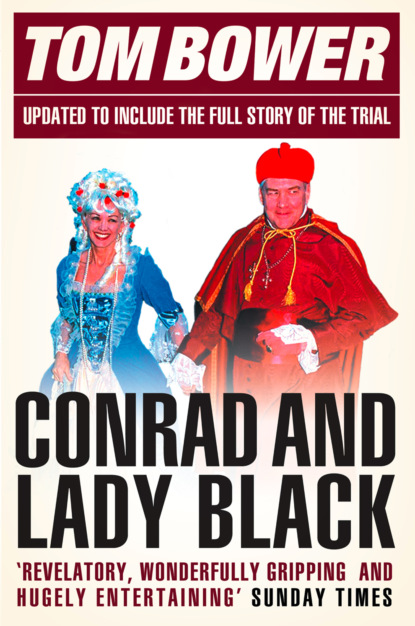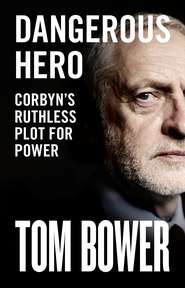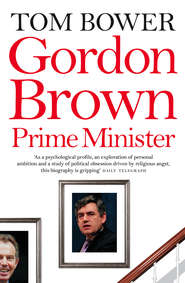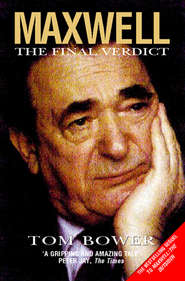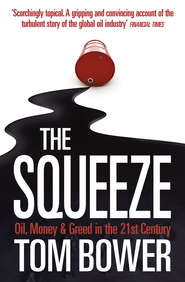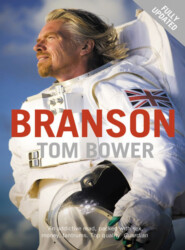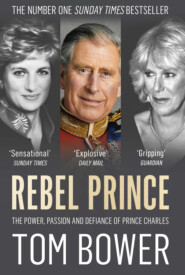По всем вопросам обращайтесь на: info@litportal.ru
(©) 2003-2024.
✖
Conrad and Lady Black: Dancing on the Edge
Настройки чтения
Размер шрифта
Высота строк
Поля
In anticipation of the crisis, Andrew Knight organised a group of advisers to represent Black on the Telegraph’s board. Besides Rupert Hambro and David Montagu, employed by Jacob Rothschild’s small merchant bank after his family bank had been sold to Merrill Lynch, Knight selected Frank Rogers, an experienced newspaper executive, and Lord Rawlinson, a former Conservative MP and law officer. If anyone in London could have understood Black’s pedigree it was Jacob Rothschild. Renowned for combining his serious patronage of the arts with partnerships alongside buccaneers like James Goldsmith and Lord Hanson, Rothschild had in 1969 advised Saul Steinberg, a rising New York tycoon, during the takeover of the Labour MP Robert Maxwell’s publishing business. In the course of the negotiations Rothschild had publicly exposed Maxwell as a crook, causing his downfall and disgrace. Yet in 1985 neither Rothschild nor David Montagu appears to have considered asking about Black’s reputation in Canada, or to have looked at old newspaper cuttings. Even among the City’s most honest scions there was a laissez-faire response to the foreign incomers passing through the capital, even to someone who had landed a remarkable deal at the Telegraph.
At Knight’s suggestion, David Montagu was appointed chairman of the Telegraph’s audit committee. Within weeks he unearthed Coopers Lybrand’s negligence. The prospectus issued by Evelyn de Rothschild’s bank to raise the original £80 million had stated that during the following six months the Telegraph would earn £5.5 million. Instead, it had lost £14.4 million. ‘An unutterable shambles,’ Montagu told Black, confirming that the Telegraph’s financial problems were worse than anyone imagined.
Black arrived quietly in London in early September 1985. Over the following days, with Knight as his guide, he was introduced to his new team. In an interlude, he telephoned the Telegraph’s classified sales department from his hotel room. ‘I want to place an advertisement,’ he told the saleswoman. Her reply was staggering. The newspaper, she announced, was full for several weeks. She advised him to try the Guardian or The Times. This was better than Black had imagined. On 24 September Black set out for dinner at Lord Hartwell’s house in Westminster, where at Richardson’s suggestion Hartwell was hosting a celebration to mark the completion of the financing arrangements. ‘There’s a need to tiptoe,’ Knight warned Black, ‘so the deal doesn’t get busted.’ Black was seated next to Nicholas Berry, Hartwell’s forty-three-year-old younger son. He intended to present himself as a family man offering help to another family in unfortunate distress.
The dinner was Nicholas Berry’s introduction to the fate of his inheritance. Until then, Lord Hartwell had excluded his two sons from the family business. During his conversation with Black, Berry concluded that the Canadian had ‘taken advantage of an old man’, and was untrustworthy. Looking across the table at Richardson, he was equally shocked. Not only had Rothschild’s issued a misleading prospectus and failed to protect his father in New York, but Richardson appeared to be courting Black as a potential new client. ‘Anyone but Black,’ he told his father. ‘We’ve got to find an alternative source of money.’ Reports of Berry’s renewed hunt for money soon reached Black. Lord Hanson, the Australian tycoon Robert Holmes à Court and representatives of the Australian Fairfax group were regaled with disparaging comments about Black, and all announced their interest in financing the Telegraph. To their dismay, they all discovered that the contract was watertight. Berry was powerless, but was also angry about N.M. Rothschild’s original failure to introduce these more suitable investors. ‘Sour grapes,’ said Richardson in reply to Berry’s protests. Nicholas Berry, Black concluded, had become ‘a pestilential irritation to us’.
(#litres_trial_promo)
Two months later, Hartwell was sinking. By November the Telegraph’s costs were out of control, and the banks refused to advance more money. On the brink of insolvency, only one source of finance was available. From Toronto, Conrad Black offered to advance £20 million in return for 50.1 per cent of the shares and control of the company. At one stage during the tense negotiations conducted by Dan Colson, Hartwell agreed to Black’s take-over, only to reverse his decision soon afterwards. At a critical meeting, the peer appeared first oblivious to his imminent downfall, and then helpless. He collapsed under the stress, and was carried comatose from the boardroom. ‘If he dies, it will save time,’ quipped David Radler from Toronto. While he was careful never to say anything cruel in public, Black did not shed any crocodile tears over his quarry. Gleefully he reported that ‘Lord Fartwell’, Private Eye’s caricature, was sinking. ‘It had become surrealistic,’ he concluded, ‘as tenacious resistance to the inevitable eventually always does, the surest sign that the endgame was finally afoot.’
(#litres_trial_promo) Conrad Black could not have anticipated how his scathing homily would become appropriate to himself eighteen years later.
As the hours ticked by, Black and Colson applied the pressure, humiliating Nicholas Berry and forcing his father’s capitulation. On 11 December 1985, the decent amateur surrendered. For just £30 million, Black had won control. To appear magnanimous, he agreed to Knight’s suggestion that Hartwell should remain as the company’s chairman and editor-in-chief, and that it was he who should announce the transfer of ownership at a press conference. Among the journalists gathered was John Fraser, Black’s old school friend, who was now working for the Globe and Mail. ‘He does not want to be any sort of newspaper tycoon,’ Fraser heard Hartwell say. ‘We have not sold out.’ Fraser’s smile widened as Hartwell continued, ‘I’m happy to report that Mr Black is an entirely passive investor with no known interests in the British newspaper business.’ Fraser’s smile grew broader. ‘They’re finished,’ he thought. ‘Everyone from Newfoundland to Victoria will be laughing and cheering Conrad on. They couldn’t even be bothered to make just one phone call to Canada.’
In Toronto, Black would have agreed. Overnight he had been transformed from a small-time publisher into an international star. ‘I’ve hit the jackpot,’ he laughed to a friend in a telephone conversation. ‘It’s a once-in-a-lifetime chance.’
(#litres_trial_promo) Black’s critics wrongly assumed that he had ‘pulled a fast one’, while he himself portrayed the deal as the product of genius, ‘maintaining a kind of symmetry as if you were conducting a symphony orchestra’. In reality, he had merely grasped an offer created by an old man’s short-sightedness and a bank’s incompetence. All that remained was to find £20 million. Despite his claim a few weeks later to have ‘earned more than $100 million’ over the years, he did not possess any meaningful sum of money.
(#litres_trial_promo) At first he asked his closest friends, including Fred Eaton, ‘Do you want a piece of the action?’ Eaton prevaricated, while others, wary of Black since the Norcen scandal, refused outright. Finally, having sold his other assets, Black scraped together £20 million, helped by his directorship of the Canadian Imperial Bank of Commerce.
In his hour of triumph, Black was elated but realistic. He knew his personal handicaps. He was unqualified to combat the British trade unions’ regular blackmail, and his financial experience of small newspapers across North America was inadequate to resolve the Telegraph’s plight. ‘Let Radler sort them out,’ he suggested to Andrew Knight. ‘Out of the question,’ replied Knight. The appearance in Fleet Street for just one hour of the ratty, uncouth hypochondriac, obsessed by fetishes about germs, would raise destructive questions about Black himself. ‘Radler is forbidden to come to London,’ ordered Knight. ‘He’s not the sort of person I’d like to see inside the Telegraph building.’ ‘Yes,’ agreed Black. ‘I don’t think the Telegraph is quite ready for David.’ A few days earlier, Knight had been invited to attend the Hollinger board meeting in Toronto summoned to approve the Telegraph deal. The sight of Radler, Peter White and Monte Black plotting like cronies about ‘a scheme to finesse this’ and ‘get control of that’ had shocked him. ‘They sniggered like bad schoolboys,’ Knight later told David Montagu. The worst, reported Knight, was Monte acting like a buffoon. Before leaving Toronto, Knight heard about the details of the Dominion pensions and Norcen controversy. Black, he realised, would not survive in London without his help.
Knight agreed to become the Telegraph’s managing director, on condition that he was given the option to buy 5 per cent of the Telegraph’s stock for £1 a share. ‘Outrageous greed,’ snarled Colson. Knight’s request, Black chorused, was a sign of ‘avarice’, and displayed ‘impenetrable arrogance’. In his experience, journalists never had the upper hand. Knight’s insistence was a novelty, but Black reluctantly acknowledged that without Knight the deal would not have occurred, and without Knight he risked losing his £30 million. Wherever he went in Washington and New York, the power-brokers always asked, ‘How’s Andrew?’ Everyone praised Knight, and he realised he was fortunate to have him as an ally. Reluctantly, he succumbed. ‘If you’re Canadian you start with one strike against you,’ he conceded. The price of being a fish in the big pond was to obey. He accepted the contract submitted by Knight, and headed to Palm Beach for Christmas.
In the sunshine he could reflect that, after seventeen years, he now owned a substantial business. The formula for his partnership with Radler remained their complementary differences. Black liked networking and loathed pernickety chores, while his partner, alias ‘The Refrigerator’ because he was cold and hard, enjoyed sweating the profits by repeatedly probing each newspaper’s finances. Their trusting relationship was cemented by distance: Radler moved to Vancouver, 2,000 miles from Toronto, where he could be with his family, while Black constantly commuted between cities, anticipating the public glory after he took control of the Telegraph. In Florida, mixing with Jayne Wrightsman and the other Palm Beach aristocrats, his fantasies expanded. Lord Beaverbrook and Lord Thomson, the two outstanding Canadian newspaper proprietors, had been treated with deference in Britain. Both had won access to Prime Ministers, and there was every reason, one day, to expect ‘Lord Black’ to follow in their footsteps. Status symbols meant a lot to Black, and although he acknowledged Knight’s warning not to appear as a lusting social mountaineer or a foreign profiteer, he did not intend to emulate Roy Thomson, whose chauffeur would buy a Tube ticket for his employer at Uxbridge station on the Metropolitan Line so he could travel the eight miles to Fleet Street. Black intended to use the Rolls-Royce Silver Wraith which Bud McDougald had appropriated from Massey-Ferguson. Repeating over cocktails in Palm Beach, ‘I’m the proprietor of the Daily Telegraph,’ the image of his destiny unfolded. Not as a mere press baron, but as a world leader – like the power-brokers who featured in countless history books in his library. His youthful fascination for visiting the graves of the famous had not been forgotten. Only the name and the dates were carved on the tombstones of Churchill, de Gaulle, Bismarck and Napoleon. One day, in the long-distant future, his grave might be similarly stark and potent, reflecting his influence on mankind’s fate.
The formal approval of the Telegraph’s shareholders was due on 20 February 1986. In anticipation, Andrew Knight was executing a revolution. At Knight’s suggestion, Black approved two new editors. Max Hastings for the Daily Telegraph, Black agreed, was a brilliant albeit surprising choice. The military historian, writer and broadcaster was a maverick, but could prove to be inspired. Knight’s selection of Peregrine Worsthorne for the Sunday Telegraph caused Black more concern. Unaware that his life’s ambition to be a newspaper editor was about to be fulfilled, Worsthorne had just lamented in the Spectator, then not owned by the Telegraph group, about the nightmare of a Canadian ruffian and asset stripper buying the Telegraph. Knight overcame Black’s reservations. ‘To my amazement,’ Worsthorne recalled, ‘he offered me the opportunity of my lifetime.’ Others had agreed with Worsthorne that Black’s imminent arrival in London was not a blessing. Charles Moore, the editor of the Spectator, commissioned John Ralston Saul, the noted Canadian writer, to write a piece introducing the Telegraph’s new owner. ‘While Mr Black personally grows ever richer,’ Saul wrote witheringly, ‘some of his companies grow ever poorer.’ To prove his argument, Saul cited how, over the previous five years, Black’s six publicly quoted companies had lost 21 per cent of their value. He observed that by posing as a historian, regurgitating huge amounts from his prolific reading and immersion among the famous at Bilderberg, Black assumed that he possessed unique insight. Black confused, suggested Saul, proximity and scholarship with understanding, and mistook bombastic proclamations for wisdom: ‘The driving force of his personality and his brilliant sense of applied historical perspectives will impress all who meet him. Only with time may they feel that the driving force deforms the perspective so that the masterful conclusions are wrong.’ Considering the fate of Conrad Black’s shareholders, his brother and the Argus widows, Saul concluded: ‘One searches for the spirit of sacrifice in Mr Black’s career and finds self-help.’
(#litres_trial_promo)
Black was outraged. There was too much truth in Saul’s assessment for comfort. Personal denigration normally provoked an instant writ for defamation, but on this occasion Black was urged by Knight to be cautious. Media owners in Britain did not issue writs, he was told, and if, just days after his coup, his first reaction to criticism was nuclear, people would become suspicious. Accepting the advice, Black confined himself to a letter to the Spectator which, he preened himself, would alert London to his erudition. Saul was accused of being ‘dishonest and malicious’, and possessed of ‘sniggering, puerile, defamatory and cruelly limited talents’. By contrast, in a sanitised version of his own past, Black presented himself as ‘unaware of any minority shareholder discontent’. He continued, ‘I have never had any difficulty with … any regulatory authority.’ No one in London, he assumed, would know about the SEC’s ‘consent’ terms linked to his bid for Hanna, or about the complaints from Argus shareholders. London tasted, for the first time, Black’s ‘truth’.
Charles Moore did not regard Saul’s analysis as anything more than a provocative and forgettable point of view which entirely failed to prove Black’s dishonesty. Those who did ask Knight about Black’s ‘sketchy reputation in Canada’ were reassured, ‘It’s in the past and isn’t relevant.’ There seemed every reason to accept that endorsement. David Montagu was less sanguine. ‘There are all sort of strains arising,’ he told Black, ‘not least the Spectator article. We must take care. Here’s a list of how to stay clean.’ Radler was to have nothing to do with the Telegraph; Black was to restrict himself to two visits a year to London until he was given the all-clear; and he was to limit himself to 60 per cent ownership of the Telegraph. In return, Montagu had negotiated blue-blooded seal of approval. Cazenove’s, the London establishment’s stockbrokers, would represent the Telegraph, and Sir Martin Jacomb, a respected City personality, had accepted a directorship. Altogether, said Montagu, the Telegraph’s new ownership was blessed with ‘a clean bill of health’. Black congratulated him, relieved that Saul’s warning had been ignored. ‘Am I doing all right?’ he asked Montagu, Jacomb and Hambro individually, reflecting his lack of self-confidence; and they, pleased by his civility, his care for Hartwell’s feelings and their impression of Shirley as ‘a perfectly nice, unambitious wife’, agreed that Black could be trusted.
John Ralston Saul’s warning also made no impression among the Telegraph’s staff. As Black walked for the first time through the rabbit warren of dusty, dimly lit offices, he was reassured by the blank faces that confirmed his anonymity. ‘I’ve just seen a very sinister man in the corridor,’ said a breathless journalist, diving into the cartoonist Nicholas Garland’s office. ‘He looks like a mass murderer. Do you think we should tell security?’ ‘Oh, no,’ replied Garland. ‘That’s the new proprietor.’
(#litres_trial_promo) The few who met Black, including Hastings and Worsthorne, were intrigued by a proprietor who enjoyed discussion, was intelligent and informed and, at Knight’s insistence, promised to make them rich. The senior executives were given share options, chauffeurs and generous expense accounts. ‘It’s like the heavens opening,’ proclaimed Worsthorne. Black could afford to be generous. During the night of 25 January 1986, Rupert Murdoch had moved his entire newspaper operation to Wapping. Confronted with barbed wire and an army of aggressive police, the trade unions’ grip was shattered. Instead of 2,000 printers, Murdoch’s newspapers would now be produced by 570 electricians. With government support, Murdoch was certain to succeed eventually, and Conrad Black would be one of the beneficiaries, although Murdoch’s new strength as a competitor added urgency to Black’s task.
The Telegraph’s circulation was sliding, and the finances were precarious. To attract new and younger readers, Max Hastings introduced features about rock music and fashion, and special pages for women readers. Dozens of older journalists were fired. ‘Max is good at drowning kittens,’ smiled Black, appreciative of his editor’s ruthlessness in his quest to improve the newspaper and earn profits. One of Black’s early contributions was a suggestion to consider employing a Canadian journalist who had recently arrived in London. ‘I think you ought to take a look at her,’ he told Andrew Knight. ‘What’s her name?’ asked Knight. ‘Barbara Amiel.’ ‘I’ll see her,’ Knight replied, but he discovered that Amiel was not interested, and the suggestion came to nothing.
More importantly, Black was concerned about Hastings’s politics. ‘Rupert Murdoch called,’ he told Knight. ‘He told me I was crazy to appoint Hastings as editor.’ ‘He told me the same,’ replied Knight, ‘but I’m ignoring him.’ Hastings’s unpopularity with Thatcherites like Murdoch and the Spectator columnist Paul Johnson justified his appointment, said Knight. Under Hastings, the newspaper would cease to be the Conservative Party’s mouthpiece, and would become more combative and original. ‘One more thing, Conrad,’ said Knight. ‘When you’re unhappy about something in the papers, don’t telephone the editor. Write a letter for publication.’
5 The Visit (#ulink_adc2f20f-31c0-5f71-bd7b-18740cfb349d)
‘CAN YOU ARRANGE IT?’ Conrad Black repeatedly asked Andrew Knight during March 1986. Impatient to reap the prizes due to the Telegraph’s proprietor, Black yearned to meet Margaret Thatcher, one of his idols.
During the few weeks since he had become recognised as the Telegraph’s owner, Black’s lifestyle had changed markedly. Friends had begun introducing him to London society. Jennifer d’Abo, a successful businesswoman, hosted pizza dinners in her kitchen. Witty and light-hearted, Black amused d’Abo’s guests with his endless insights and information apparently gleaned from many sources – either his newspaper editors or politicians. The word spread that the Telegraph’s new owner was a desirable social catch. David Metcalfe, an insurance broker, grandson of Lord Curzon, was another eager host. At a succession of cocktail receptions, dinners and weekend parties, Black’s warmth and intelligence were noted and he was embraced. ‘A loyal and good friend,’ concluded Metcalfe and others who accepted Black at face value. ‘Conrad believed,’ Metcalfe would tell a friend, ‘that the world was his oyster, and London society reassured him that his performance was acceptable.’ Since the City establishment had been joined by Max Hastings, Peregrine Worsthorne and the veteran former Telegraph editor Bill Deedes in endorsing their employer, there seemed no reason to dig into his past.
When Black was in London countless invitations to parties, dinners and opening nights at the theatre and Covent Garden began arriving, flattering his self-esteem. His lust for more than ‘a ringside seat at everything’ grew, inflating his opinion of himself and validating his importance in Canada. The opportunities to meet British and foreign politicians in London fed his hunger to consort with the mega-rich and the powerful in the White House, Buckingham Palace and Downing Street. The Telegraph was not merely the means to earn an income and propagate his ideas, but had become his passport to social climbing. ‘Who’s that?’ Black asked Paul Johnson’s wife Marigold when they met at a party in the French Embassy. ‘And who’s that? And that person, is he important?’ Marigold Johnson was shocked. ‘I realise the allegation is about that I am somewhat of a seeker of celebrities,’ Black later admitted, ‘and in one sense I suppose that’s true. But my purpose is that celebrities who are justly celebrated can be very useful to you.’
(#litres_trial_promo) The casualties were the celebrities’ wives, including those of Jacob Rothschild and the Duke of Marlborough. ‘I won’t again sit next to a man who lectures me throughout dinner,’ said one wife, ‘about the layout of the navies at the Battle of Jutland or reels off a list of all the kings of Sweden since the eighteenth century.’ Black’s new friends were undecided whether his amusing lectures reflected arrogance, insecurity or insensitivity. Like others, the Johnsons were puzzled by Black’s parochialism. On his first visit to their house he looked shocked by a plate of mussels, especially when other guests ate them by hand. As a preliminary to meeting Margaret Thatcher, Andrew Knight arranged to call on Charles Powell, Thatcher’s foreign policy adviser, in Downing Street. ‘What do you think Powell thought of me,’ Black repeatedly asked Knight afterwards. The judgement in Downing Street, Knight did not reveal, was that Black was ‘a provincial hick’.
‘Hello Margaret,’ smiled Black as he entered Chequers with Andrew Knight on 2 April 1986. Thatcher’s close staff, accustomed to calling her ‘Prime Minister’, were surprised by Black’s assumption of equality. They were to be even more surprised by his conduct. After the pleasantries, Black embarked on a monologue, lecturing his hostess about her place in British history alongside Pitt and Disraeli. His fluent performance was honed as much to massage his own ego as to flatter his audience. He was too enraptured by his own verbal elegance to notice his hostess’s astonishment. Propriety required that she mask her impatience and ‘listen carefully’. The Conservative Party relied on the Telegraph group, and it was politic to humour its owner. Her concealment succeeded. Unknown to her visitor, Thatcher rarely listened to what she was told. Her only interest was what she would say in reply. Impervious to her true sentiments, Black was pleased, as they bade farewell, that Thatcher ‘patted me most considerately on the shoulder and said, “That is very good, Mr Black. Do come back.”’ As his Rolls-Royce drove down the gravel driveway, Black asked Knight impatiently, ‘How did it go? What do you think she thought of me? Do you think she respected me?’ For several days he repeated the questions. ‘I’m sure she thought you know more about the history of the Tory Party than she does,’ replied Knight, protecting Black from the truth, ‘but that only goes so far.’
Before their meeting, Thatcher had been aware of Black’s opposition to hanging, not because he was against capital punishment, but because he felt hanging was ‘too good for them’. She had wrongly assumed that that was said in jest. After their meeting, she told her aides that compared to Black, ‘I’m a liberal wet.’ An intimidating bore, she concluded of the new proprietor. Unlike Rupert Murdoch, whom she genuinely liked, she decided to tolerate Black because the Telegraph was important, but he would be classified as ‘low profile’.
Over the following days Black regaled many about his successful visit. Among his listeners was Peter Munk, a self-made Canadian billionaire whose company, Barrick, would become the world’s biggest gold extractor. Shortly after visiting Chequers, Black flew with Munk by helicopter to Highgrove to lunch with Prince Charles. Munk had skied with Charles at Klosters, and offered him an opportunity to persuade a friendly newspaper proprietor to treat the royal family with more consideration. ‘You’ll like Prince Charles,’ Munk told Black. ‘He’s a good guy and you should help him.’ Their encounter began with a tour of Highgrove’s organic garden. At the beginning of lunch Charles explained his vegetarianism. Black seized the cue. Throughout the meal, a torrent of history poured from him, describing the British royal family’s eating habits. Ignoring Charles’s obvious distaste for the excruciating details of his grandfather George VI’s tendencies, Black did not stop until minutes before he departed. ‘Not a success,’ Charles later told an aide. Gossip about Black’s behaviour spread around London. ‘He’s such a heavy personality to escort around,’ Knight told a friend. ‘I have to keep him away from the paper to prevent revolt.’ Black himself was sensitive to that danger. Without protest, he even obeyed Knight’s instruction to stay away during the Queen’s visit to the newspaper’s new premises as part of her tour of London’s Docklands. That was a worthwhile price to pay if he was to shed his tarnished reputation in Canada. With patience he could emerge as a cleansed, acceptable character in London, and become influential and rich.
Max Hastings, an excellent journalist, historian and analyst, was a valuable ally in that quest. Energetically, Hastings was transforming the Telegraph into a respectable mouthpiece for independent Conservatism. Black, however, was not wholly enamoured. There were, he noted, some unattractive aspects of Hastings’s Toryism. The editor was critical of Margaret Thatcher’s strident antagonism towards the public services; he bore an Englishman’s mistrust of American politicians; and he was convinced that the Telegraph’s future depended on abandoning its blind support for the Conservative Party. As proprietor, Black was entitled to express his opinions and to seek to persuade his editor to reconsider his newspaper’s position on any issue. His profound knowledge of history and his ability to recite tidal waves of obscure political facts strengthened the credibility of his opinions. The correlative was his myopic intolerance of contrary views and his distrust of those who wrote for his papers. ‘I’m not a particularly great admirer of journalists,’ he said. ‘A great many of them are irresponsible. They have great power, and many of them are extremely reckless.’
(#litres_trial_promo) Among those he most distrusted was the polemicist Christopher Hitchens, who had suggested in the Spectator in July 1985 that the announcement of President Reagan’s cancer treatment deliberately concealed his more serious Alzheimer’s. In a protest letter to the Spectator, Black criticised Hitchens as ‘a disgrace to the profession [who] should not be employed’. Hitchens’s article, Black continued, was motivated by ‘nasty, macabre, vulgar and insolent claptrap’ which revealed the ‘lack of integrity and serious analysis in British and most foreign reporting of American affairs’. To silence Hitchens, Black threatened to buy every newspaper that offered him employment. Although Hitchens’s article would prove to be accurate, Black showed no remorse. He espoused, as Max Hastings discovered, his own version of the truth.
Black’s disagreement with Hastings’s opinions remained restrained until the US Air Force bombed Libya on 14 April 1986 in retaliation for Colonel Gaddafi’s support of a terrorist attack in Berlin. Black, preparing to fly to Britain to attend the Bilderberg Conference at Gleneagles in Scotland, was infuriated by the Telegraph’s condemnation of President Reagan’s bombardment. His newspaper, he believed, should reflect his own unquestioning support of America. He admonished Hastings for his ‘seriously fallacious analysis of what was really happening’. Colonel Gaddafi had after all, said Black, supplied the IRA with weapons. Black wanted a warmer embrace of Reagan and America. Hastings disagreed. Black’s brand of American Republicanism, he said, was unsuitable for a British audience. On that issue, Black won. ‘Since Conrad was the principal shareholder in the paper,’ Hastings would concede, ‘it would have appeared discourteous to trample gratuitously on his most cherished convictions.’
(#litres_trial_promo) That exchange was a precursor to more intervention. Black would forbid the use of the word ‘Irangate’, referring to the secret and illegal supply of weapons by President Reagan to Iran, on the grounds that the Watergate affair was far more serious; and while tolerating Hastings’s support for sanctions against South Africa to end apartheid and his opposition to capital punishment, he would criticise his ‘incorrect thinking’ about Northern Ireland. To Black’s credit, he did not countermand Hastings’s dismissal as a columnist of Margaret Thatcher’s daughter Carol for working as a freelance without permission. The Prime Minister was livid, and pledged never to invite Hastings to Downing Street again.
(#litres_trial_promo) Black was embarrassed, but tolerated his editor’s authority, although increasingly Hastings received not only letters of complaint but midnight telephone calls from across the Atlantic, during which Black would nitpick at length, regardless of the time.
(#litres_trial_promo) Black’s intolerance towards journalists matched his fierce reaction to those in Canada who had questioned his honesty in business.
Black’s political certainties concealed his personal insecurity. Despite the psychoanalysis thirteen years earlier, he continued to suffer ‘bouts of miscellaneous obsessive fear’ and depression. One cure was his growing interest in religion, especially the mystical teaching of Cardinal Newman, the nineteenth-century English theologian and philosopher.
(#litres_trial_promo) In Newman’s view, a man’s personality cannot be called into question, because God reveals Himself in a man’s conscience. Black’s interest in Newman provoked intense conversations with God, drawing him closer to the hierarchical Catholic Church. His need for spiritual assurance from the font of undisputed authority was matched by his wife Shirley’s own increasing attachment to the Catholic Church, but this only widened the schism in their marriage as they stumbled over their incompatibility.
At Knight’s suggestion the Blacks had bought a house in Well Road in Hampstead, in north-west London, near Knight’s home. The leafy district had been historically fashionable with writers and artists, but not among London’s social elite. To the inhabitants of Knightsbridge and Belgravia, Black’s choice of neighbourhood, a twenty-five-minute drive from Harrods, reflected his provincialism. Some assumed that he knew no better, while others correctly judged that Shirley felt more comfortable living a middle-class life beyond the carping gripes of London’s socialites. In the interests of his marriage and Knight’s stricture to remain out of sight, Black endorsed his wife’s desire for modesty. Their principal home, they agreed, would remain in Toronto. Their divided lives intensified her misgivings and his turmoil. Her concerns were ignored while he sought to resolve his own confusion. His solution, after long conversations in England with the writer and scholar Malcolm Muggeridge, and in Toronto with Archbishop Carter, was to formally convert to Catholicism. ‘I was resistless against the benign temptations of religious practice,’ Black wrote, but he recognised the need for Catholicism’s ‘sane, rigorous and consoling’ teaching to comfort his spirit. Catholicism’s inflexibility about morality and conscience perfectly suited a man who enjoyed breaking the rules. Notionally, he accepted Cardinal Newman’s opinion that a man’s conscience was the ‘powerful, peremptory, unargumentative, irrational, minatory and definitive [words of] God speaking in our minds’.
(#litres_trial_promo) That was precisely the process of self-justification that preceded all his misdeeds. On 18 June 1986 Black was formally converted, and thereafter he wanted to be known as a passionate and uncompromising believer. Conrad Black had crossed another Rubicon.
Under the management of Andrew Knight and Max Hastings, the Telegraph’s losses of £15 million in 1986 were transformed in 1987 into a small profit. The paper’s circulation began to increase, and Black bought the conservative weekly the Spectator from the Australian Fairfax Group, which had plunged into financial crisis. Hollinger’s shares in Canada soared as the value of Black’s coup and Rupert Murdoch’s victory in Wapping became evident. ‘I want to build a first-class newspaper company,’ Black told a London newspaper, and added, ‘I am not a seeker after status here,’ denying his expectation of a peerage. No one cast doubt on his claim to possess assets worth C$650 million, and no one queried the huge loans against which he had used his assets as collateral.
(#litres_trial_promo) Although Black was wealthy, he lived in a comparatively modest home in Hampstead, and while his journalists shared some of the profits, there were limits. Journalists who compared his income with their own when asking for a pay increase were lampooned. ‘I earn a lot because I’m a capitalist,’ he said gleefully, ‘and you are a seeker after the truth.’
In the summer of 1987 the Telegraph moved from Fleet Street to South Quay in London’s Docklands. Under Knight’s plan, the company’s 2,200 printers would be reduced to 507 men supervising automated machines and robots, while the 413 men currently employed to compose the hot metal plates would be replaced by twenty-seven technicians. If the plan succeeded, the Telegraph’s profits in 1988 were projected to rise to £29 million. At that moment, the first fissure in Black’s hitherto unruffled performance opened. ‘They’re mad,’ Dan Colson told him. ‘Don’t let them de-man. There’ll be strikes.’ Colson had assumed a special role in Black’s business, but Knight was appalled by his interference. ‘You’ve got to back myself and the management,’ Knight insisted during a telephone call to Canada. Without an alternative, Black agreed. The redundancies were achieved without strikes, and the Telegraph’s annual profits were projected to rise to £40 million.
This was the beginning of Conrad Black’s halcyon era, and he was flying. His income from the Telegraph, and the prospect of selling his 5 per cent stake in the Southam newspaper group in Canada at a considerable profit, reinvigorated his appetite for deals and expansion. In that atmosphere, he decorated his new office in Docklands with the symbols of tyrants and inspirational leaders, including busts of Cardinal Newman and Napoleon. Few could understand his fascination for the ruthless French warmonger, but the media’s attention to his passion for a despot tickled Black’s self-importance. ‘I’ve never found him an attractive personality,’ Black said about Napoleon, while admitting his fascination for ‘a great talent … a military commander and a mythmaker’.
(#litres_trial_promo) Hero-worship fed Black’s illusion of his own growing importance among the world’s leaders.
At the 1987 Bilderberg conference by Lake Como in Italy, hosted by Gianni Agnelli, the chairman of Fiat, Black was treated like a head of state, speeding around the area with a police escort. For the next twelve months, in anticipation of the leaders of the Group of Seven countries’ meeting in Toronto, Black assiduously cultivated Margaret Thatcher. 22 June 1988 was his red-letter day. In her speech to the Ottawa Parliament in the morning, Thatcher praised Black as the most important Canadian in London. That evening she appeared as guest of honour at the Hollinger annual dinner. Surrounded by Canada’s elite, Black introduced the world-famous leader, and in reply Thatcher praised her host as a star who was continuing the tradition of Canadians in Fleet Street, mentioning Lord Beaverbrook and Lord Thomson. After great applause, Thatcher was in turn thanked by Henry Kissinger, who also referred to Black in glowing terms. No one could ignore that night’s adulation of their host. Certainly, Black believed, his fellow countrymen would be persuaded to forget their earlier slurs. He anticipated a peerage and much more. He had already called at 10 Downing Street and asked Charles Powell, ‘What does one have to do to get a peerage?’ Unfortunately, Powell had not been helpful, so Black put out feelers among Thatcher’s advisers. His peerage, he believed, would not take long. Like Roy Thomson, he too might be posthumously remembered in St Paul’s Cathedral, although he was unsure whether Thomson’s commemorative plaque in the crypt – ‘He gave a new direction to the British newspaper industry. A strange and adventurous man from nowhere, ennobled by the great virtues of courage and integrity and faithfulness’ – would do him sufficient justice. Only Hal Jackman, bemused by Hollinger paying a fortune to entertain politicians, offered a reality check. ‘Why do you have all these people for dinner, Conrad?’ he asked. ‘Good for business,’ replied Black. ‘More like social climbing,’ laughed Jackman.
Вы ознакомились с фрагментом книги.
Приобретайте полный текст книги у нашего партнера:
Приобретайте полный текст книги у нашего партнера:





